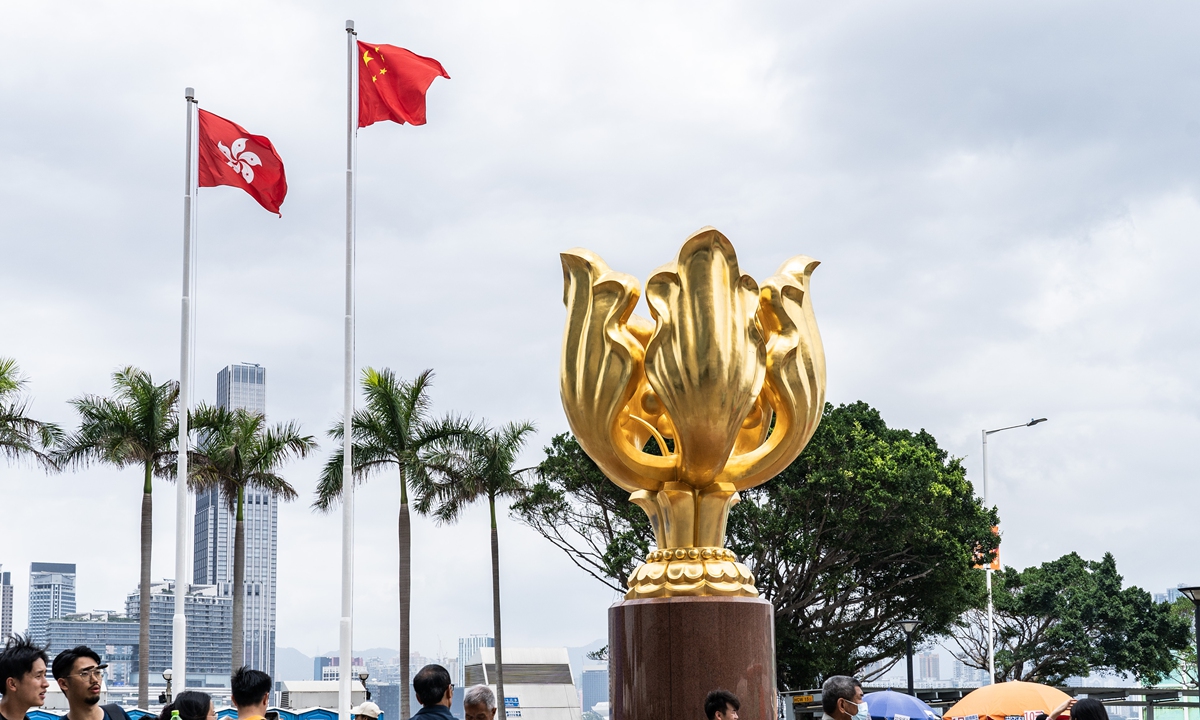
Hong Kong residents and tourists visit the Golden Bauhinia Square on March 23, 2024. Photo: VCG
Alphabet's YouTube said it will comply with Hong Kong's latest court decision and block access to video links related to the controversial song "Glory to Hong Kong." When conducting business, compliance to local laws and regulations is a mandatory practice, and it is not enough to just block the content in Hong Kong but the song should be removed globally, some lawmakers and experts said.
YouTube said it will block access inside Hong Kong to 32 video links to the song. This move comes after the Court of Appeal recently granted
an interim injunction to stop a range of acts including broadcasting and performing the song with the intention of inciting separatism or the intention of advocating for the separation of Hong Kong from China.
The controversial song has the potential to rally people to overthrow the government and has even been misused multiple times at sporting events.
Though YouTube said it will comply with the local court's decision, it said the ruling "would raise skepticism around the Hong Kong government's work to foster the digital economy and reclaim its reputation as a predictable place for doing business," Reuters reported on Wednesday.
Preventing anyone from using and disseminating relevant songs with the intention of inciting secession and insulting the national anthem is a legitimate and necessary measure for the Hong Kong Special Administrative Region to fulfill its constitutional responsibility of safeguarding national security and the dignity of the national anthem, Chinese Foreign Ministry spokesperson Wang Wenbin said on Wednesday when commenting on the decision by YouTube.
The injunction clearly draws a red line. The EU, the US and other places have used legal power to force Google to remove problematic content, but it has not affected the development of the local innovation and technology industry and creative industry, lawmaker Elizabeth Quat, who chairs Hong Kong's Legislative Council's information technology and broadcasting panel, told the Global Times on Wednesday.
Quat went on to say that YouTube saying that the ruling "will affect Hong Kong's reputation" is absurd.
Compliance of local laws and regulations is a mandatory practice when conducting business. Removing the seditious song from the open platform and efforts continuing to maintain a good systematic library management are essential, Chu Kar-kin, a veteran current affairs commentator and deputy secretary-general of the Hong Kong Association for Promotion of Peaceful Reunification of China, told the Global Times on Wednesday.
Alphabet is a listed US company and shall act legitimately, morally and responsibly. Equipping with video and sing search functions, YouTube should ensure only the accurate and universal correct solutions be displayed to avoid misleading and misunderstandings, Chu noted.
"We understand that 'Glory to Hong Kong' is a notorious protest song which symbolizes inciting rebellion, armed revolution, terrorism and unrest, conveying messages of hatred, violence and disobedience. This is clearly a threat to mankind. I also suggest YouTube consider banning the upload and display of the song in their platform globally," the expert said.
Echoing Chu, Quat said the song could be used for dissemination and incitement, and therefore it must be removed. The lawmaker believes that it is not enough for YouTube to block the song in Hong Kong. The Hong Kong government should keep fighting until all online platforms follow the court injunction and remove the song globally.
According to the lawyer representing the Department of Justice of the Hong Kong Special Administrative Region, "Glory to Hong Kong" has been mistakenly treated as the national anthem 887 times, saying that violence is not the only means to overthrow a government in today's society; spreading rumors and false information can be a more effective weapon.
The banning of the song is in line with the spirit of Hong Kong's rule of law and the national security law, Louis Chen, a member of the Election Committee and general secretary of the Hong Kong Legal Exchange Foundation, told the Global Times on Wednesday.
"I believe YouTube must abide by US laws in the US, and naturally it must abide by Hong Kong laws in Hong Kong," Chen said.




